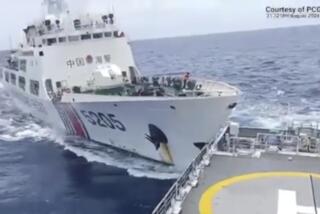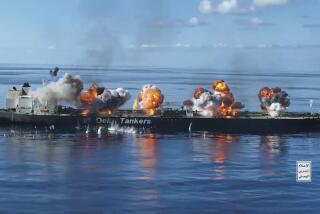U.S. Offers Regrets for Gulf Attack but Won’t Accept Full Blame
WASHINGTON — The United States expressed “regrets” Wednesday to the governments of India and the United Arab Emirates for a U.S. warship’s apparently mistaken attack on an Emirates fishing boat in the Persian Gulf, but stopped short of accepting full blame for the incident.
State Department spokesman Charles Redman said that the United States also is sending condolences to the family of an Indian crew member who was killed aboard the fishing boat. According to witnesses, the victim was hit by American machine-gun fire when the guided-missile frigate Carr, operating at night, apparently took the small vessel for an Iranian gunboat.
“The United States regrets the loss of life, regardless of the circumstances,” Redman declared. “. . . There does appear to be this evidence that this Indian citizen was killed, and we find this a regrettable incident.”
Inquiry in Progress
But U.S. officials stopped short of accepting full blame for the incident and refused to say whether the United States will pay compensation to the victim’s family. A Pentagon spokesman said Navy officials still are trying to “gather the facts” about what occurred and have not changed any of the instructions or rules for U.S. warships in the gulf.
The incident took place Sunday, shortly after sundown, near Abu Musa, an Iranian-held island in the Persian Gulf that U.S. officials say has been a base for Iranian patrol boats.
According to the original Pentagon account released Monday, the Carr was escorting an American cargo ship, the MV Patriot, through the gulf when the Patriot was approached by what the Pentagon called “a suspected Iranian dhow and two Boston Whaler-type vessels.”
Warning Shots Fired
The Carr tried to contact the vessels and then fired warning shots, the Pentagon said in its written statement. Despite these warnings, it said, one of the boats continued to move toward the Patriot. The Carr then opened fire with its .50-caliber machine guns, and the boat quickly stopped, turned and sped off.
On Monday, a Pentagon spokesman acknowledged that it was not absolutely certain the boats were Iranian. The spokesman also said that U.S. officials did not know whether the Carr’s fire had caused any injuries.
A day later, witnesses and shipping officials in the United Arab Emirates port of Sharjah said that the Carr had fired on a 30-foot, unarmed Emirates fishing skiff called the Al Hudei, killing an Indian crewman who was standing on its bow. Another Indian crew member on the Al Hudei said that his boat had been racing to catch up to two other fishing vessels when the U.S. warship signaled it to stop and, minutes later, opened fire.
Identity Unclear
Sources interviewed Tuesday in the Persian Gulf, including another crewman on the Al Hudei, identified the slain sailor as Jagadeh Baghadan. In his comments Wednesday, State Department spokesman Redman identified the victim as Bikwan Kamgee. There was no immediate explanation of the discrepancy.
Shipping officials in Sharjah said that the Al Hudei and the two fishing vessels near it were all “Barracuda” fishing boats--open-decked, fiberglass vessels that resemble Boston Whalers and that do not carry radios.
At the White House on Wednesday, presidential spokesman Marlin Fitzwater told reporters: “It’s my understanding that a U.S. frigate was approached by a boat in the dark. (The boat) was warned away, and it did not respond and turn off, and it was given a warning shot.”
In a new written statement, the Pentagon said Wednesday that details of the incident “are still ambiguous.” Nevertheless, it added: “Our operational procedures are well known, and any action perceived as hostile intent to U.S. warships will be taken seriously.”
More to Read
Sign up for Essential California
The most important California stories and recommendations in your inbox every morning.
You may occasionally receive promotional content from the Los Angeles Times.










